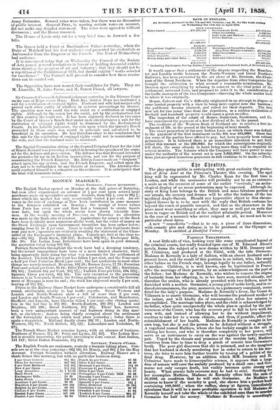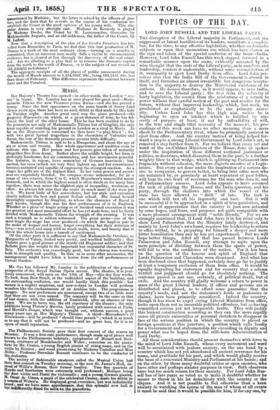Int ghtlitti.
The play-going public is anticipating with great curiosity the produc- tion of King Lear at the Princess's Theatre this evening. The aged king will be represented by Mr. Charles Kean for the first time in London, and while the accessories will probably not be on so extensive a scale as on the occasion of some of the earlier "revivals," an archae- ological display of no mean pretensions may be expected. Although the story of King Lear belongs to the British and moot fabulous portion of our annals, the scenery and dresses will be after the fashion of the less mythical Anglo-Saxons. Should any hypercritic object to this chrono- logical licence he is to be met with the reply that British costume lies beyond the reach of possible research, and that as the characters in the piece must wear something or other, they may as well put on suits that were in vogue on British soil at the earliest attainable period. Moreover in the case of a monarch who never reigned at all, we need not be too particular about dates. A new " comedietta "—that is to say, a piece of farce dimensions, with comedy plot and dialogue, is to be produced at the Olympic on Monday. It is entitled A Doubtfid Victory.
PARISIAN THEATRICALS.
A neat little tale of vice, looking very like some complicated legend of the criminal courts, but really founded upon one of M. Edmund About's novels, forms the subject of 'a new drama written by MM. Deanery and H. Cremieux, and produced at the Gaite, with the title Germaine. Madame de Kermidy is a lady of fashion, with an absent husband and a present lover, and the result of this position is an infant, who, like many other babies on the French stage, belongs legally to one father, naturally to another. Children, it is well known, can be legitimized in France after the marriage of their parents, by an acknowledgment on the part of the father ; but Madame de Kermidy, who wishes to remove the stigma of bastardy from her offspring, is, as we have seen, married already, and therefore the urchin, who is already provided with two fathers, must be furnished with a mother. Germaine, a young girl of noble birth, and in re- duced circumstances, the prey, moreover, to a pulmonary complaint, seems fitted for the lady's purpose. Madame de Kermidy's lover, the Count de Villanera is to marry Germaine, who will become the professed mother of the infant, and will kindly die of consumption when her mission is accomplished. The marriage takes place, and the child is acknowledged by its father, when quite unexpectedly the whole plan is spoiled by the per- verseness of the Count, who has the mauvaic gout to fall in love with his own wife, and instead of allowing her to die without impediment, resolves to take her- to a warm climate, and thus, if possible, effect the reestablishment of her health. Madame de Kermidy is caught in her own trap, but she is .not the person to be defeated without a struggle. A vagabond named Mathieu, whom she has luckily caught in the act of robbing her house, and who is therefore completely in her power, will serve as an instrument to carry on the war against the newly-married pair. Urged by the threats and promises of the terrible lady, Mathieu contrives from time to time to drop a pinch of arsenic into Germame's broth. The poor girl discovers that she is poisoned, and as she imagines that her husband is slowly murdering her in order to return to his mis- tress, she tries to save him further trouble by tossing off a goblet of the fatal drug. However, by an addition which MM. Dennery and H. Crdmieux have made to homoeopathic science, it appears that a large dose of arsenic will cure the malady produced by a small one ; and Ger- maine not only escapes death, but visibly becomes quite strong and hearty. When arsenic fails recourse may be had to steel. Sending for her accomplice Mathieu, Madame de Kermidy offers him the sum of 50,000f. on condition that he will stab Germaine. As Mathieu is anxious to know if the security is good, she shows him a pocket-book containing 100,000f.; when the ruffian, sharp at figures, immediately calculates that it will be a more profitable operation to kill Madame de Kermidy herself and take the whole of the exhibited sum than to murder Germaine for half the money. - -Madame de Kermidy- is accordingly stuassinated by Mathieu; but the latter is seized by the officers of jus- tice, and the theta that he reveals in the course of his confession re- establish the Count in the good opinion of his young wife. This sin- gular drama is very strongly cast. Madame de kermidy is played by Madame Decho, the Count by M. Lacressoniere, Germaine by Mademoiselle Augusta, and an old nobleman, the father of the Count, by M. Wont. Now that a description of the plot of Les Grades Forestiers has tra- velled from Marseilles to Paris, we find that this last production of M. Dumas is a work of the most ordinary class,—turning on a murder so committed, that an innocent man nearly falls a victim to circumstantial evidence, but is cleared at last through the discovery of the real crimi- nal, Are wo alluding to a play that is to remove the dramatic capital from the north to the south of France, or is the subject of our record an old Adelpbi melodrama ?
The aggregate receipts of all the places of public amusement during the month of March amount to 1,254,956f. 90o., being 193,241f. 85c. less than those of February. This difference represents the contrast between Lent and the Carnival.



























 Previous page
Previous page